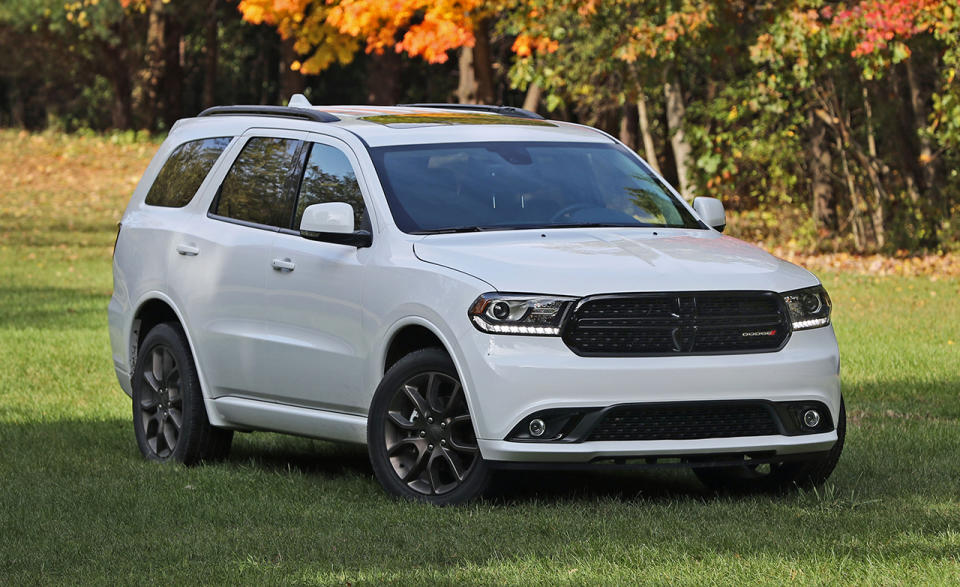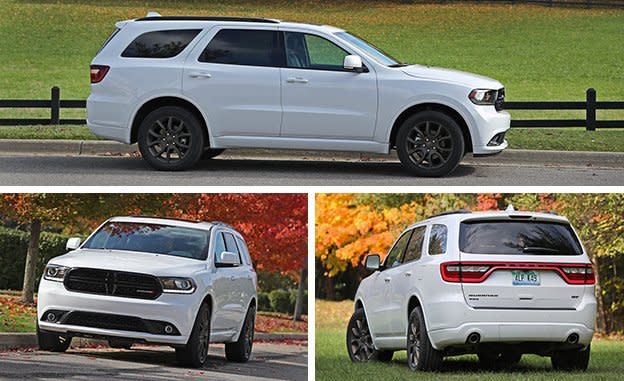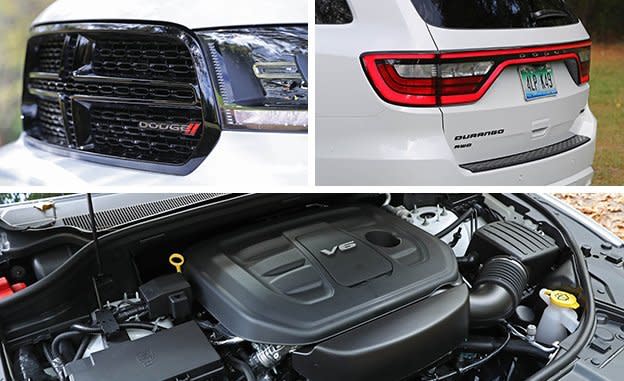2017 Dodge Durango V-6 AWD

Part of Fiat Chrysler Automobiles’ most recent five-year plan was to recast Dodge as “America’s mainstream performance brand.” (Their words, not ours.) What followed included 707-hp Hellcats and track-oriented Vipers and the demise of nonsporty sedans such as the Avenger and (soon) the Dart. But it’s not all about burnouts and hot laps at Dodge, as a few more middle-of-the-road offerings like the Durango three-row crossover still exist to hold up the “mainstream” end of that slogan.
That’s not to discredit the Durango, which offers more thrills than many of its competitors—especially when equipped with the rip-roaring Hemi V-8 engine, lowered ride height, and more aggressive looks of the R/T trim. Not all three-row crossover shoppers need or want 360 horsepower, though, and a majority of Durangos sold are the more sensible V-6 version. To help spread the Dodge sportiness across more models, the 2017 Durango now offers a V-6–powered GT trim (replacing the previous Limited) with a monochromatic appearance that resembles that of the R/T for several thousand bucks less.

To our eyes, it works. The GT’s body kit and 20-inch wheels nicely accentuate the Durango’s muscular stance. Our test car also had the $595 Brass Monkey package, which paints those wheels an attractive shade of bronze. (We certainly hope the Beastie Boys are getting royalties.)
So-So Numbers
The performance angle fades a bit when you look at the Durango’s test numbers. To its credit, this 2017 version was a bit quicker than a similar V-6 AWD model we tested three years ago, getting from zero to 60 mph in 7.4 seconds and running the quarter-mile in 15.7 seconds at 89 mph, 0.2 and 0.1 second better than before. And yet, a Mazda CX-9 was 0.2 second quicker to 60 mph in our testing, and the Honda Pilot was a whopping 1.4 seconds ahead. Don’t go stoplight drag-racing other crossover-driving parents unless you’ve splurged for the Durango V-8, which does zero to 60 mph in 6.2 seconds.
Skidpad grip of 0.76 g and a 70-to-zero-mph braking distance of 182 feet also lagged behind the Mazda and the Honda, which is no surprise considering that the 5111-pound Durango weighs nearly 800 pounds more than either Japanese-brand SUV.
Taken beyond the numbers, the Durango remains satisfying to drive. While most other three-row crossovers use front-wheel-drive platforms derived from mainstream mid-size sedans, the Durango’s chassis is a rear-driver that was developed, in conjunction with the Jeep Grand Cherokee, alongside the Mercedes-Benz GLE-class SUV going back to the end of the DaimlerChrysler days. That results in a behemoth that’s confident in its responses, from the nicely weighted steering to the way its suspension soaks up bumps with nary a reverberation through the stiff structure. The 3.6-liter Pentastar V-6 engine also enjoys its job motivating the big Durango, doing so with adequate punch and a pleasing engine note to boot—even if it can’t match the growl of the Hemi.

Big Beast
The Durango’s heftiness is partially attributable to its size, as the Dodge has a longer wheelbase and a greater length than either the Honda or the Mazda. Despite its larger footprint, the Dodge’s rear-drive layout isn’t quite as space-efficient as the Pilot (which has more passenger volume), and the interior feels less airy and spacious than the Honda’s. And our test Durango’s all-black cabin did nothing to help it feel any roomier.
Still, the Dodge’s second- and third-row seats are comfortable even for adults, with the back row’s elevated “theater” seating position helping avoid the knees-in-your-chest feeling prevalent among many three-row SUVs. The seats fold and tumble easily, too, and our only real complaint with the rear-seat setup is that the second-row bench doesn’t slide. Captain’s chairs that reduce seating capacity to six are available for $995 extra on most trims, and the third row is a $695 option on the base Durango SXT which now has a two-row, five-seat interior as standard.
Our seven-seat test car was loaded up with a $2395 Premium package (Beats audio system, navigation, power liftgate, and a sunroof) and a $1195 Safety and Security package (blind-spot warning, automatic high-beams, HID headlights, rain-sensing wipers, and a power-adjustable steering column). Tack on a $1995 rear entertainment center with two screens mounted on the backs of the front seats and our as-tested price rose to $47,370—not an absurd sum for a big SUV but not exactly a bargain, either, given that it still lacks features such as adaptive cruise control and the aforementioned captain’s chairs.

The value equation isn’t helped by the Durango’s relatively uninspired interior design. Its 8.4-inch Uconnect touchscreen functions well, but the cabin plastics and upholstery give off a decidedly non-premium vibe. The new Mazda CX-9 in its top Signature trim level has raised the stakes in this class, with gorgeous wood and leather that shame many pricier luxury crossovers. Dodge isn’t the only one playing catch-up, but this is where the Durango’s age is most evident: its cabin materials were considered advanced for the segment when it arrived in the 2011 model year.
Aging Well Overall
Yet it’s admirable how class-competitive the Durango remains. Features like an engine stop/start system and new active-safety tech have been added over the years, and its EPA fuel-economy and performance numbers remain in the hunt. (The last Durango we tested with the V-6 and all-wheel drive averaged 19 mpg during its stay.) True to Dodge’s mission statement, the Durango’s continuing appeal rests on its athletic look and solid driving dynamics that give it more of a muscle-car-like attitude than anything else in its class.
Specifications >
VEHICLE TYPE: front-engine, 4-wheel-drive, 7-passenger, 4-door hatchback
PRICE AS TESTED: $47,370 (base price: $33,690)
ENGINE TYPE: DOHC 24-valve V-6, aluminum block and heads, port fuel injection
Displacement: 220 cu in, 3604 cc
Power: 295 hp @ 6400 pm
Torque: 260 lb-ft @ 4000 rpm
TRANSMISSION: 8-speed automatic with manual shifting mode
DIMENSIONS:
Wheelbase: 119.8 in
Length: 201.2 in
Width: 75.8 in Height: 70.9 in
Passenger volume: 132 cu ft
Cargo volume: 17 cu ft
Curb weight: 5111 lb
C/D TEST RESULTS:
Zero to 60 mph: 7.4 sec
Zero to 100 mph: 20.5 sec
Zero to 110 mph: 27.2 sec
Rolling start, 5–60 mph: 7.9 sec
Top gear, 30–50 mph: 4.2 sec
Top gear, 50–70 mph: 5.5 sec
Standing ¼-mile: 15.7 sec @ 89 mph
Top speed (governor limited): 117 mph
Braking, 70–0 mph: 182 ft
Roadholding, 300-ft-dia skidpad: 0.76 g
FUEL ECONOMY:
EPA city/highway driving: 18/25 mpg

 Yahoo Autos
Yahoo Autos 